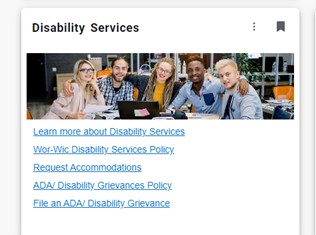Wor-Wic provides reasonable accommodations for individuals with disabilities in compliance with the Americans with Disabilities Act (ADA) of 1990 and Section 504 of the Rehabilitation Act of 1973.
Documentation can be an official evaluation or letter from a licensed professional that clearly states your diagnosis, or an IEP or 504 from your high school. The college does not evaluate, diagnose or treat disabilities. Appropriate documentation should be submitted to the disability services counselor at least four weeks before the start of classes so that eligibility can be determined and the appropriate accommodations can be made.
Text, voice and computer modem users can call Wor-Wic toll free through the Maryland Relay Service by calling Customer Service 1-800-552-7724 or 410-767-6960 (Voice/TTY); Customer Service 1-443-453-5970 (Video Phone).
Based on an evaluation of your needs, you may be eligible for the following accommodations:
Reasonable accommodations do not include personal care attendants, private tutors, or waiving of required coursework.
Current credit students can access the disability services “card” on the myWor-Wic portal and click on the link that says, “Request Accommodations.” Disability documentation, such as an IEP, 504 or doctor’s note can be attached right on the form.
The card looks like this:

Once this form is received, the disability services office will reach out to the student to schedule an intake meeting and discuss accommodations.
Students that are taking non-credit/CEWD courses that wish to request accommodations, please complete the form through this link.
Discrimination and harassment can seriously damage the integrity of an educational institution, destroy the institution’s positive work and educational atmosphere and cause psychological and physiological damage to the victims. The college condemns such activity and is strongly committed to promoting a work and academic environment free from discrimination and harassment and to addressing and resolving complaints in a timely fashion.
Wor-Wic Community College does not discriminate on the basis of age, gender, race, color, religion, national origin, marital status, sexual orientation, genetic information, gender identity, disability, income level, limited English proficiency or any other characteristic protected by law in the admission and treatment of students, access to educational programs and activities, and the terms and conditions of employment.
This policy applies to all students, employees, visitors, and third-party vendors who are hired by the college. This policy covers any prohibited conduct that occurs on campus or off campus when conducting college business or is circulated at or from the college, during college operating hours or using college equipment, via email, phone, voice mail, text messages, tweets, blog posts, social networking sites or other means.
Students who believe they have experienced discrimination or harassment based on disability should contact:
Dr. Deirdra G. Johnson
Vice President for Strategic Initiatives and Community Engagement
Wor-Wic Community College
MTC 103D
32000 Campus Drive
Salisbury, Maryland 21804
410-334-2940
djohnson@worwic.edu